Ethics board narrows Spraggins/Hendricks complaint, schedules hearing on three allegations
Get AI-powered insights, summaries, and transcripts
Subscribe
Summary
After reviewing a Department of Law memorandum, the Board of Ethical Conduct on Oct. 1 recommended a hearing on three narrow allegations that a fair‑board commissioner may have violated Metro standards of conduct.
After reviewing a Department of Law memorandum, the Board of Ethical Conduct on Oct. 1 recommended a hearing on three narrow allegations that a fair‑board commissioner may have violated Metro standards of conduct. The board voted to dismiss three other claims and set a tentative hearing date for Nov. 24, 2025, at 10 a.m.
The Department of Law summarized six allegations against the commissioner and advised the board that three of them—accepting free admission or access to a private event from a vendor seeking a significant contract, receiving media or public‑relations direction from a vendor’s representative in connection with an active contract discussion, and disclosure of confidential deal materials not yet public—could, if proven, be deemed violations of the Metropolitan Code standards of conduct. The department recommended dismissal of the remaining counts, including claims that campaign contributions alone constituted an ethics violation and that the conduct was within procurement‑code violations or outside the ethics statute’s scope.
The memo cited Metropolitan Code §2.2220.02 (subparagraphs e, k and l) and relevant Tennessee public‑records law in explaining the confidentiality and impartiality obligations that apply to such officials. Attorney Eke of the Department of Law told the board that if the three allegations were true ‘‘they could be deemed to be a violation of the standards of conduct.’’
Chair Diani asked board members to consider the law memo’s conclusions. After brief discussion the board voted to accept the Department of Law’s recommendation: dismiss the counts the department said gave rise to no standards‑of‑conduct violation and proceed to a hearing on the three allegations the department flagged. The motion to proceed carried unanimously; the board then discussed scheduling and set the hearing for Nov. 24, 2025 at 10 a.m. in the Metro Office Building, with the clerk directed to circulate hearing procedures and document‑submission deadlines.
The board instructed parties that witness lists and all exhibits must be filed and provided to opposing parties and the clerk at least seven days before the hearing and that the parties would be provided the board’s hearing procedures, including evidentiary and pre‑hearing logistics. The board’s clerk also will provide guidance about how confidential or exempt records will be handled in the hearing process.
What the board did not do was reach any final factual findings on the underlying allegations; rather, it narrowed the charges to the three identified claims and authorized a fact‑finding proceeding. The board also formally recorded its findings that the other allegations in the Department of Law memorandum did not, on their face, constitute a standards‑of‑conduct violation and were dismissed from further consideration.
The hearing logistics and the board’s role: The Nov. 24 hearing will be an evidentiary, fact‑finding proceeding before the Board of Ethical Conduct. The clerk’s office will provide contested‑hearing procedures, including the standard of proof the board applies (preponderance of the evidence), rules on exhibits, and guidance about public or sealed portions of the record. Parties should expect the board to permit witnesses to be sworn, cross‑examined and to allow the board to question witnesses for clarification.
By moving only the three allegations to a hearing, the board limited the scope of what will be litigated: whether the commissioner accepted an impermissible benefit tied to his official position, whether he sought or accepted direction from a vendor about public messaging regarding the redevelopment, and whether he disclosed confidential documents outside of the official process. The clerk’s office will post hearing materials and logistical instructions for all participants and will accept motions and stipulations in advance of the hearing.
(Reporting note: direct quotes attributed in this story come from the Department of Law presentation to the Board of Ethical Conduct on Oct. 1, 2025; the board’s schedule and deadlines were read into the record during the same meeting by the chair and the clerk.)
